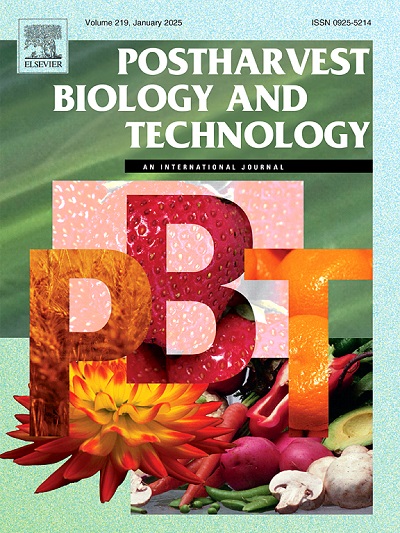熊果酸是一种天然内源性化合物,可抑制鲜切苹果的褐变
IF 6.4
1区 农林科学
Q1 AGRONOMY
引用次数: 0
摘要
鲜切苹果会迅速发生酶促褐变,从而导致经济损失。虽然已经开发出多种方法来防止这种褐变,但物理方法成本高昂,化学方法也存在争议,这表明内源性天然褐变抑制剂具有潜在的作用。本研究调查了天然内源化合物熊果酸(UA)对苹果褐变的影响。研究发现,熊果酸通过 Cu2+ 螯合作用抑制了多酚氧化酶的活性。分子对接表明,这种抑制作用是可逆的、混合型的。此外,UA 处理可促进鲜切苹果中活性氧的清除,并减少苹果表面微生物的增殖。在栗子、茄子、马铃薯和梨的褐变过程中也观察到了类似的效果。总之,研究结果表明了 UA 在抑制鲜切苹果褐变方面的功效,并对其中的机理进行了分析。本文章由计算机程序翻译,如有差异,请以英文原文为准。
Ursolic acid, a natural endogenous compound, inhibits browning in fresh-cut apples
Enzymatic browning occurs rapidly in fresh-cut apples and can lead to economic losses. Although various methods have been developed to prevent this browning, physical methods are costly, and chemical methods are controversial, suggesting the potential usefulness of an endogenous natural browning inhibitor. In this study, the effects of ursolic acid (UA), a natural endogenous compound, on apple browning were investigated. It was found that UA inhibited the activity of polyphenol oxidase through Cu2+ chelation. Molecular docking indicated that the inhibition was reversible and mixed-type. Moreover, UA treatment promoted the scavenging of reactive oxygen species in fresh-cut apple and reduced the proliferation of microorganisms on the apple surface. Similar effects were observed on the browning of chestnut, eggplant, potatoes, and pears. In conclusion, the findings demonstrate the efficacy of UA on inhibiting browning in fresh-cut apple, together with an analysis of the mechanism involved.
求助全文
通过发布文献求助,成功后即可免费获取论文全文。
去求助
来源期刊

Postharvest Biology and Technology
农林科学-农艺学
CiteScore
12.00
自引率
11.40%
发文量
309
审稿时长
38 days
期刊介绍:
The journal is devoted exclusively to the publication of original papers, review articles and frontiers articles on biological and technological postharvest research. This includes the areas of postharvest storage, treatments and underpinning mechanisms, quality evaluation, packaging, handling and distribution of fresh horticultural crops including fruit, vegetables, flowers and nuts, but excluding grains, seeds and forages.
Papers reporting novel insights from fundamental and interdisciplinary research will be particularly encouraged. These disciplines include systems biology, bioinformatics, entomology, plant physiology, plant pathology, (bio)chemistry, engineering, modelling, and technologies for nondestructive testing.
Manuscripts on fresh food crops that will be further processed after postharvest storage, or on food processes beyond refrigeration, packaging and minimal processing will not be considered.
 求助内容:
求助内容: 应助结果提醒方式:
应助结果提醒方式:


